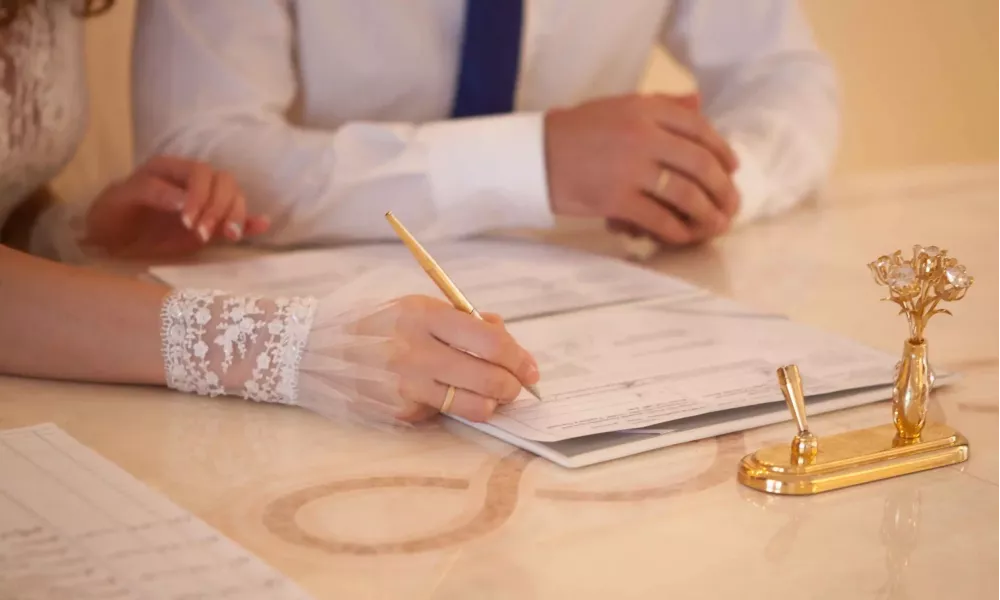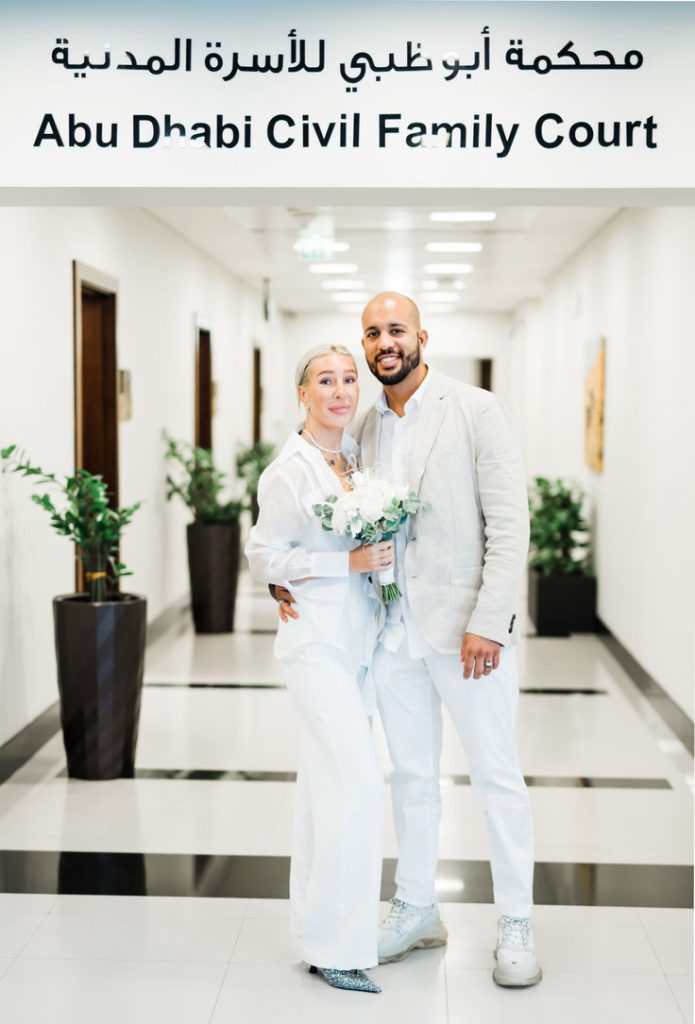
Civil Marriage in UAE: A 2025 Legal Guide for Foreigners and Expats
Table of Contents ▼
If you’re living in Dubai or anywhere in the United Arab Emirates, you already know this region is booming. It’s not just about the economy. The UAE is now a top place for civil marriage and expat marriage. Many foreigners meet their partners here and choose to take the next step — getting married in the UAE.
However, the civil marriage process in UAE can be tricky. Laws vary depending on your nationality, religion, and the emirate where you live. Still, with the right plan, marriage in UAE is 100% possible.
This guide explains everything. From legal documents and timelines to cultural tips and a comparison with other countries. If you’re planning a civil marriage in UAE or just looking for a get married Dubai guide, this post will walk you through every step.
Table of Contents
Why Is the UAE a Popular Place for Foreigners to Get Married?
The United Arab Emirates has become a melting pot of cultures, with people from more than 200 nationalities living and working here. Whether you’re a long-time resident or just visiting, the UAE offers modern infrastructure, organized court systems, and now even civil marriage options for non-Muslims.
That being said, the UAE marriage law 2025 comes with its own set of challenges, especially for expats and interfaith couples. That’s why understanding the legal marriage process beforehand is essential.
Civil Marriage in the UAE: How to Get Married in UAE
Step 1: Visit Your Embassy or Religious Authority
Before starting any paperwork, you must consult your embassy or consulate. Requirements for getting married vary depending on your nationality and religion.
For religious weddings, your church, mosque, or temple might have its own rules or documentation you need to submit first. For civil weddings, your embassy will inform you about the legal requirements and the documents you must provide.
Step 2: Obtain a Certificate of No Impediment to Marriage (CNIM)
This document proves that you are legally single and eligible to marry. Here’s what you need to know:
- Where to get it: Your country’s embassy in the UAE or from your home country
- Who needs it: Both partners, unless already married or divorced
- Important notes:
- Must be issued within the last 3 months
- Needs to be attested by the UAE Ministry of Foreign Affairs
- If divorced, you must provide your original divorce certificate, duly attested
- Must be issued within the last 3 months
Step 3: Gather All Required Documents
Here’s a quick checklist of documents you may need for Dubai marriage registration or a civil wedding in Abu Dhabi:
- Valid passport copies of both partners
- UAE residency visa (at least one partner must be a resident)
- Emirates ID of resident partner
- Birth certificates
- CNIM or Singleness Certificate
- Original divorce/death certificate (if previously married)
- Passport-size photographs (minimum four)
- Medical certificate from an authorized UAE health center
- Proof of entry stamp (if one or both are visitors)
- Completed application form from the court
- Letter of consent from bride’s father or guardian (or in-person presence)
Note: For Muslim marriages, you will need two Muslim witnesses with a valid Emirates ID. Non-Muslim brides should have witnesses of the same nationality.
Step 4: Get Medical Clearance
You and your partner must undergo a premarital medical screening at a government-approved health center. This is a mandatory requirement under UAE law. The test screens for infectious diseases such as HIV, hepatitis, and genetic conditions.
Step 5: Attend the Court Ceremony
Once your documents are ready and approved, you can schedule your court appointment. Here’s what to expect:
- The court will verify your documents
- Witnesses and guardian (if required) must be present
- You’ll take your vows in front of the judge
- You’ll receive a marriage certificate, usually the same day or within 2–3 working days
If you’re considering a Muslim court marriage, click ‘Muslim court marriage” for step-by-step details specific to Islamic marriages.
Always consult a professional wedding planner before starting your civil marriage process in the UAE.

Estimated Timeline for Civil Wedding in UAE
| Process | Time Required |
| Embassy Consultation | 1–2 days |
| Document Collection & Attestation | 1–3 weeks |
| Medical Screening | 1–2 days |
| Court Appointment | 1–2 weeks (varies) |
| Certificate Issuance | Same day or 2–3 days |
| Certificate Attestation for Overseas Use | Up to 10 days |
Civil Marriage UAE vs. Other Countries
| Country | Residency Needed | Legal Recognition Globally | Timeframe |
| UAE | Yes (for one) | Yes (after attestation) | 2–4 weeks |
| Georgia | No | Yes | 2–3 days |
| Seychelles | No | Yes | 5–7 days |
While the foreigner wedding UAE process takes longer, it’s ideal for couples who live and work in the UAE and want their wedding to be recognized locally.
Cultural Considerations
- In the UAE, family involvement is still valued, especially for women. In many emirates, the bride’s father or guardian is expected to give consent.
- Islamic law applies to Muslim couples, while non-Muslims can marry under civil law (especially in Abu Dhabi).
- Mixed-faith marriages may be permitted depending on the religion and nationality of the couple. Some embassies may not issue a CNIM for interfaith couples.
Most Popular Places for Marriage Registration in the UAE
- Dubai Court – Convenient and commonly used by expats
- Abu Dhabi Civil Family Court – Ideal for non-Muslim civil ceremonies
- Sharjah and Ajman Courts – Traditional setup with religious options
- Ras Al Khaimah & Fujairah – Quieter emirates, shorter waiting times
What is the process for a civil wedding in UAE?
A civil wedding in the UAE involves five key steps: embassy consultation, obtaining a CNIM, gathering documents, taking a medical test, and attending a court ceremony. The process varies by emirate but is now more streamlined, especially for non-Muslims.
How can I start my Dubai marriage registration?
To register your marriage in Dubai, visit the Dubai Court with all required documents, including Emirates ID, passport copies, and CNIM. You’ll also need medical clearance from an approved UAE health center. Once approved, your certificate is issued the same day or within a few days.
Is expat marriage in UAE legally recognized?
Yes, expat marriages are fully legal and recognized in the UAE if all legal steps are followed. Civil and religious ceremonies are both options, depending on your background and nationality.
What does the UAE marriage law 2025 say about civil ceremonies?
The updated UAE marriage law in 2025 has made civil marriage more accessible for non-Muslims and foreigners. Abu Dhabi now allows civil marriages without religious requirements, making it easier for interfaith and expat couples.
What’s involved in the foreigner wedding UAE process?
Foreigners must provide attested documents like the CNIM, valid passports, visa/residency, and complete a premarital medical screening. Depending on your religion or nationality, additional approvals may be required.
Where can I find Dubai court marriage details?
Dubai Court handles both religious and civil marriages. You’ll need to bring the bride’s guardian, two witnesses, and the required documents. Booking ahead and arriving with completed forms can speed up the process.
8. Any Abu Dhabi civil ceremony tips?
Book early, as Abu Dhabi Civil Family Court is popular for non-Muslim civil weddings. Ensure documents are translated into Arabic if needed. The process is quick, and many expat couples find it more relaxed than other emirates.
9. How can I legalize overseas marriages from UAE?
To legalize a foreign marriage in the UAE, you’ll need to submit your marriage certificate for attestation at your home country’s embassy and the UAE Ministry of Foreign Affairs. Once attested, it will be recognized by UAE authorities.
Final Thoughts: Is It Worth Getting Married in the UAE?
The short answer is: Yes, if you’re prepared. While the process can feel overwhelming, especially for foreigners and expat couples, it’s manageable when broken down into steps. The key is early planning, proper documentation, and understanding your specific situation.
If you want your marriage to be recognized locally and internationally, getting married in the United Arab Emirates — especially in Dubai or Abu Dhabi — is absolutely possible.
Don’t forget to explore all options based on your religion, nationality, and urgency. And if you’re looking for Muslim court marriage details, this guideline, “ Muslim court marriages,” can help simplify the journey.



